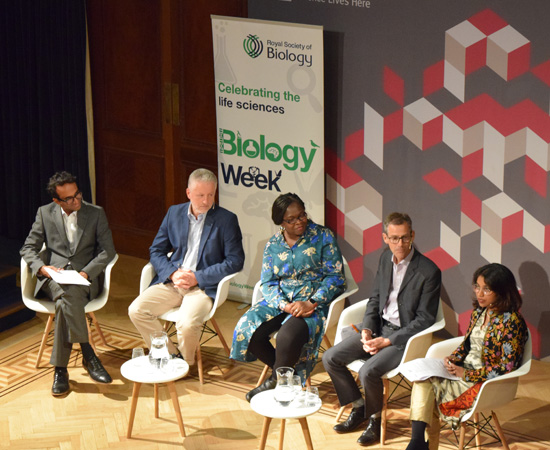News
Panel discuss the next global threat to change all our lives at Biology Week debate
- Details
- 05 October 2022
The Royal Society of Biology brought together a panel of experts at the Royal Institution yesterday to discuss what they think could potentially, irreversibly alter our lives, and what can be done before it is too late.

From left to right: Professor Ravi Gupta FRSB, Professor Luca Börger, Professor Diane Ashiru-Oredope, Professor Jim Watson and Dr Nazia Habib.
Over 200 people joined the event online and in-person to hear what the experts had to say about biodiversity loss, antimicrobial resistance, climate change and food security.
The panel of four came together to discuss their work and their thoughts and opinions, with the event chaired by Professor Ravi Gupta FRSB, professor of clinical microbiology at the Cambridge Institute for Therapeutic Immunology and Infectious Diseases.
Professor Luca Börger, chair in ecology and biodiversity and co-director for the Centre for biomathematics at Swansea University, began the session by giving an overview of the impact of land-use change on local terrestrial biodiversity and how data can be used to map and show biodiversity loss across the globe.
He went on to discuss his research into animal movement dynamics under environmental change and the effects of nature-based tourism on wildlife, commenting: “animals move away from hikers and hunters equally, but when there is a high frequency of hikers, it becomes very difficult for animals to distinguish between lethal and non-lethal disturbance and they will therefore respond less to hunters.”
He also touched on the importance of citizen science, using the example of the Adaptive Management of Barriers in European Rivers initiative, as a way to collect data and get people involved in the scientific process.
Professor Diane Ashiru-Oredope, pharmacist lead for the antimicrobial resistance and healthcare associated infections at the UK Health Security Agency, then discussed the importance of tackling antimicrobial resistance.
Speaking about antimicrobials becoming increasingly ineffective as drug-resistance spreads globally, she noted that there is both an impact on individuals and healthcare. She went on to add that raising awareness, infection prevention, and the development of new antimicrobials are some of the ways to control pathogens and tackle resistance.
Professor Jim Watson, professor of energy policy and director of the Institute of Sustainable Resources at University College London, raised the point of the necessity of shifting away from fossil fuels to reduce emissions that contribute to climate change. He talked about his recent visit to Zambia, saying: “they are one of the countries on the frontline of climate change, they have been suffering from a lot of drought and have basic issues of connecting their population to energy systems.”
Jim then examined the UK energy sector, noting: “the UK only gets 45% of its power from fossil fuels for electricity, it used to be 80%, but the challenge is to shift other uses of fossil fuels, like heating your home, to electricity.”
Dr Nazia Habib, founder and research centre director for the Centre of Resilience and Sustainable Development at the Department of Land Economy, completed the panel presentation by arguing that research must have a transdisciplinary approach, where different stakeholders must be involved to discuss issues. In terms of food security, she added that it is important to realise connections between political and commercial aspects to promote efficient asset management.
The panel then answered a diverse range of questions from Ravi and the audience. Topics such as human-wildlife conflicts, reducing our reliance on plastics, and the loss and damage of climate change were covered, sparking a wealth of interesting discussions.
Find out about what else has been going on during Biology Week.

